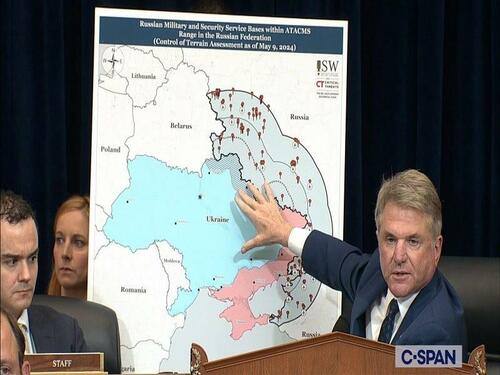
Authored by Andrew Korybko via Substack,
Secretary of State Antony Blinken finally decided to drop the charade.
One of the worst-kept secrets of the NATO-Russian proxy war in Ukraine is that the US allows its client state to use American arms for striking inside of Russia despite officially prohibiting it from doing so. Sergey Poletaev explained the pseudo-“legal” means through which this happens in his latest piece for RT, but now Secretary of State Antony Blinken finally decided to drop the charade and more openly allow Ukraine to do so without going through these largely symbolic workarounds.
He responded to Chairman of the House Foreign Affairs Committee Michael McCaul’s criticism of these operational restrictions during a hearing by declaring that “Ukraine will have to make and will make its own decisions” on the use of these arms even though the US doesn’t endorse attacks inside of Russia. The New York Times then reported on the same day that the Biden Administration is deliberating whether to formalize this new unofficial policy, though that debate is now moot and just a distraction.
The reality is that the US has always tacitly approved Ukraine’s use of these weapons for striking inside of Russia, it’s just now more openly allowing this as a morale-booster amidst Russia’s fresh push into Kharkov Region, which is re-entered without any resistance due to unbuilt border fortifications. Nevertheless, seeing as how this coincides with talk of formalizing some NATO countries’ unofficial training missions inside that country, it’s clear that the West is escalating its involvement in the conflict.
Keeping the aforesaid two policies an open secret enables these two to “save face” to an extent, thus facilitating the management of their security dilemma by reducing the odds of either side “overreacting” such as when Ukraine strikes Russia with Western arms and Russia kills NATO trainers. If either was formally acknowledged upon totally doing away with this charade, then there’d be lots of pressure from hawkish policymakers and members of society to reciprocally respond, which would risk World War III.
These two latest Ukrainian-pressured examples of “mission creep” – solely with respect to their optics since these policies have already been in effect for some time – are therefore obviously intended to bring NATO and Russia to the brink of a direct conflict. This is exactly what Russian Ambassador to America Anatoly Antonov assessed when reacting to the recent congressional hearing when Blinken signaled that his country will more openly allow Ukraine to use its arms to strike inside of Russia.
Russia seemingly anticipated this development and that’s likely why it announced tactical nuclear weapons exercises earlier this month as was explained here at the time, with the primary intent being to deter a full-fledged NATO invasion, especially one that approaches or crosses the Dnieper. In the last-mentioned scenario, Russia might resort to the use of tactical nukes in self-defense per its doctrine in order to preemptively stop an imminent NATO invasion of its newly unified formerly Ukrainian regions.
It's imperative that this red line isn’t approached, let alone crossed, otherwise World War III could easily break out by miscalculation given Russia’s national security perceptions that were just explained. With that in mind, it’s best to asymmetrically partition Ukraine via the model that was shared here earlier this spring, which includes a demilitarized buffer zone in the Kiev-controlled regions east of the Dnieper. Regrettably, the US hasn’t expressed any interest in this scenario, hence why it continues escalating.
That being the case, it can’t be ruled out that the two latest Ukrainian-pressured examples of “mission creep” will prompt Russia to escalate in response, thus climbing the escalation ladder and bringing the world closer to the brink through no fault of its own since it has the right to do so in self-defense. If this vicious cycle isn’t soon stopped through a creative diplomatic solution for ending the conflict, then a conventional NATO intervention might be inevitable with all that entails for bringing about World War III.
Authored by Andrew Korybko via Substack,
Secretary of State Antony Blinken finally decided to drop the charade.
One of the worst-kept secrets of the NATO-Russian proxy war in Ukraine is that the US allows its client state to use American arms for striking inside of Russia despite officially prohibiting it from doing so. Sergey Poletaev explained the pseudo-“legal” means through which this happens in his latest piece for RT, but now Secretary of State Antony Blinken finally decided to drop the charade and more openly allow Ukraine to do so without going through these largely symbolic workarounds.
He responded to Chairman of the House Foreign Affairs Committee Michael McCaul’s criticism of these operational restrictions during a hearing by declaring that “Ukraine will have to make and will make its own decisions” on the use of these arms even though the US doesn’t endorse attacks inside of Russia. The New York Times then reported on the same day that the Biden Administration is deliberating whether to formalize this new unofficial policy, though that debate is now moot and just a distraction.
The reality is that the US has always tacitly approved Ukraine’s use of these weapons for striking inside of Russia, it’s just now more openly allowing this as a morale-booster amidst Russia’s fresh push into Kharkov Region, which is re-entered without any resistance due to unbuilt border fortifications. Nevertheless, seeing as how this coincides with talk of formalizing some NATO countries’ unofficial training missions inside that country, it’s clear that the West is escalating its involvement in the conflict.
Keeping the aforesaid two policies an open secret enables these two to “save face” to an extent, thus facilitating the management of their security dilemma by reducing the odds of either side “overreacting” such as when Ukraine strikes Russia with Western arms and Russia kills NATO trainers. If either was formally acknowledged upon totally doing away with this charade, then there’d be lots of pressure from hawkish policymakers and members of society to reciprocally respond, which would risk World War III.
These two latest Ukrainian-pressured examples of “mission creep” – solely with respect to their optics since these policies have already been in effect for some time – are therefore obviously intended to bring NATO and Russia to the brink of a direct conflict. This is exactly what Russian Ambassador to America Anatoly Antonov assessed when reacting to the recent congressional hearing when Blinken signaled that his country will more openly allow Ukraine to use its arms to strike inside of Russia.
Russia seemingly anticipated this development and that’s likely why it announced tactical nuclear weapons exercises earlier this month as was explained here at the time, with the primary intent being to deter a full-fledged NATO invasion, especially one that approaches or crosses the Dnieper. In the last-mentioned scenario, Russia might resort to the use of tactical nukes in self-defense per its doctrine in order to preemptively stop an imminent NATO invasion of its newly unified formerly Ukrainian regions.
It’s imperative that this red line isn’t approached, let alone crossed, otherwise World War III could easily break out by miscalculation given Russia’s national security perceptions that were just explained. With that in mind, it’s best to asymmetrically partition Ukraine via the model that was shared here earlier this spring, which includes a demilitarized buffer zone in the Kiev-controlled regions east of the Dnieper. Regrettably, the US hasn’t expressed any interest in this scenario, hence why it continues escalating.
That being the case, it can’t be ruled out that the two latest Ukrainian-pressured examples of “mission creep” will prompt Russia to escalate in response, thus climbing the escalation ladder and bringing the world closer to the brink through no fault of its own since it has the right to do so in self-defense. If this vicious cycle isn’t soon stopped through a creative diplomatic solution for ending the conflict, then a conventional NATO intervention might be inevitable with all that entails for bringing about World War III.
Loading…





